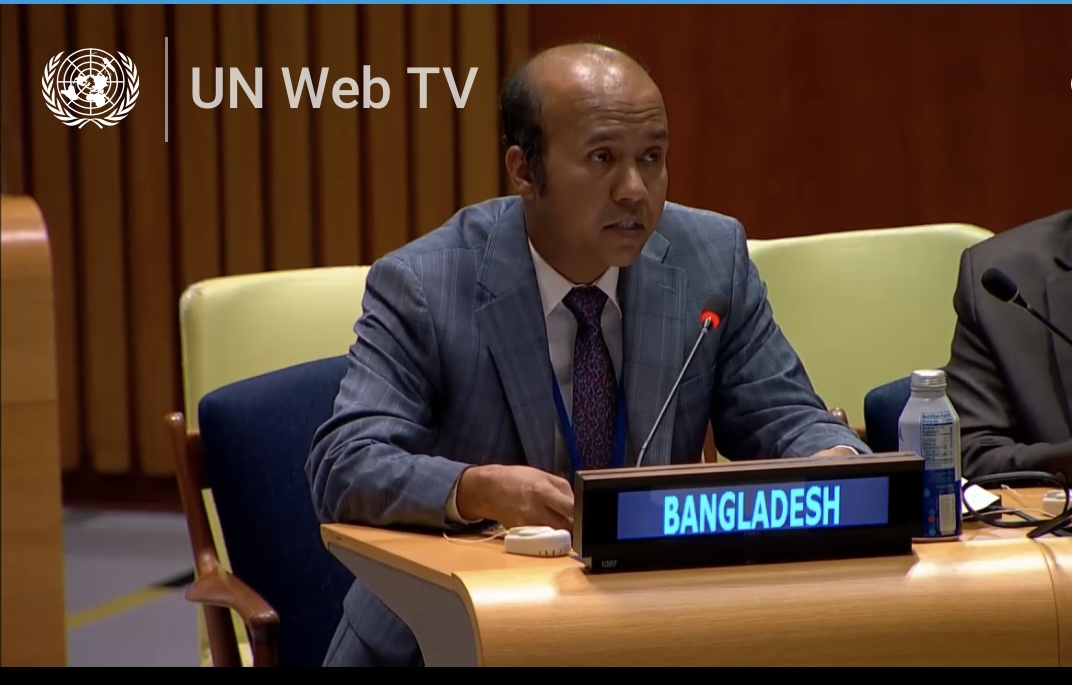Mr. Chair,
I thank you for giving me the floor.
Emerging global trends indicate that there is a stark upsurge in the number of disasters in this century compared to the previous one. Over the past two decades, disasters have nearly doubled compared to the preceding twenty years, affecting more than 4 billion people. According to the UN Office for Disaster Risk Reduction Human Cost of Disaster Report 2020, from 2000 to 2019, we witnessed more than 7,000 major recorded disaster events that claimed 1.23 million lives and resulted in approximately US$2.97 trillion in global economic losses.
This alarming trajectory is projected to continue exacerbated by carbon dioxide concentrations reaching their highest levels in at least 2 million years. In the face of these daunting challenges, it is imperative to establish a universally accepted legal instrument to protect the individuals in the event of disasters.
Bangladesh warmly embraces the International Law Commission’s recommendation to elaborate a convention addressing the “Protection of Persons in the Event of Disasters.” In this regard, we commend the draft articles put forth on this subject.
We believe that the conclusion of such a convention will facilitate an effective and timely response to disasters, disaster risk reduction, and promote the rights and dignity of the affected people as well as address their need for assistance. However, such a convention would have to be in sync with and bring synergies to the existing legal frameworks.
Mr. Chair,
Bangladesh stands as one of the most disaster-prone countries globally. Floods, tidal surges, cyclones, and river erosion have become increasingly frequent. Due to our geographic location, natural disasters pose substantial challenges to the hard-earned development gain in Bangladesh. Nevertheless, we have made remarkable strides in disaster preparedness, encompassing rescue, recovery, and the protection of our people during disasters. We have established the Disaster Management Act and crafted a comprehensive National Plan for Disaster Management covering the period 2021 to 2025, aligning it with the United Nations Sendai Framework for Disaster Risk Reduction.
The government has undertaken an initiative to build nearly a million disaster resilient houses for the landless, homeless and displaced families across the country. We have built 16.4 kilometres of sea dykes, 12,000 cyclone shelters and 2 hundred thousand hectares of coastal plantation. Substantial investments have been made in early warning systems for disaster risk reduction, resulting in a significant reduction in fatalities compared to the millions lost during the 1970 Cyclone. Furthermore, we have one of the world’s largest community volunteers programmes comprising 65,000 coastal people.
We have benefitted from the support of the international community in disaster management before. Now we are ready to share our good practices and locally led technologies and practices with international community.
Mr. Chair,
The draft articles presented by the International Law Commission provide a solid foundation for disaster risk reduction. They encompass critical aspects, including the responsibility of affected states to ensure protection of their people and the role of the international community in providing immediate assistance upon the request of the affected nation. By and large, these draft articles encompass the essential dimensions and collaborative components needed to safeguard individuals during disasters.
Nevertheless, there exist certain articles open to further deliberation and scope for introducing new elements. Capacity building and technical assistance for member states to prevent disasters, as well as the protection of vulnerable groups, including women and children, are critical issues we aspire to see incorporated into the articles. We shall remain actively engaged in upcoming working group meetings dedicated to the negotiation of these draft articles.
This concludes my intervention.
I thank you, Mr. Chair.

